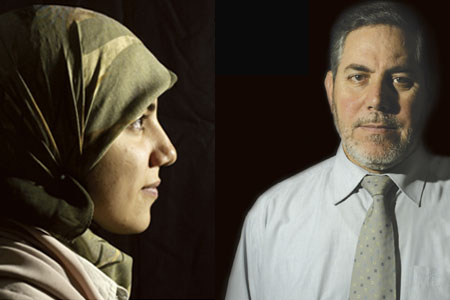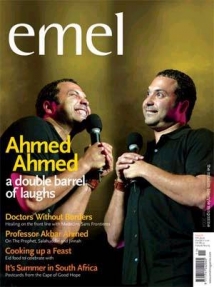
Kith & Kin - Amal & Walid
Issue 8 Nov / Dec 2004
First Published on November/December 2004
To access the issue page, click here
Amal:
I was born in May 1987, and unlike my father I didn’t have to work - I had my imagination and a secure atmosphere - my childhood was fun and privileged. My family is large and so I had many people to play with, and even my experiences at school were great - there wasn’t any racism and everybody was accepting.
However, though I was born and bred in England and have a British nationality I have always considered myself Syrian, as well as British. Though I have never been there, the most special moments of my childhood were when my father would tell us stories of when he was young and he would go out with his friends or go to the mosque, and talk about his experiences in the different jobs he has had. They are very interesting and funny stories and have always seemed ‘magical’ in some way. I have always used these stories as a base for the stories and poems I write in my spare time. I enjoy reading and writing and like to contemplate on the meanings of words when I listen to poems and songs. This is one of the reasons that helped restore my Arabic tongue, as when we were younger, me and my siblings would use the English language frequently and forgot our Arabic. As we grew older we realised that Arabic is the language of the Qur’an and of our grandfathers, so we gave it more attention. Certainly, when I would listen to the Qur’an or read Arabic text and pay attention to the literatur-e I would realise how rich and unique the language is.
I enjoy reading a lot and since I am studying A-level English literature I spend a lot of my time reading novels, but I also read widely on politics and human rights, thanks to my dad’s numerous books on those topics. I find my dad’s work very interesting and am impressed at his commitment to such stressful and shocking cases. The people in Syria need someone to tell the world about the conditions they are living in, and my father is one of the few people who does this. I try to involve myself in politics and community work when I can, such as when I went to the demonstrations against the war in Iraq. When the Palestinian second uprising broke out, there was only me and another girl in my class who knew what was happening in Palestine and we would do our best to tell our classmates about what was happening, even after September 11th when many attitudes changed towards Arabs and Palestinians. Our efforts seemed to have an effect as the girls in our class began to read more on the Palestinian issue and began to question the media.
My father has always been a great source of knowledge and encouragement. If I have a question regarding linguistics, history or politics he gives me an answer. He encourages me and my brothers and sisters to go to camps and conferences, where we learn more about Islam, dawah and other areas of knowledge.
I hope to study English literature as my father did, and hope that more Muslims will enter this field. It would be nice to enter the London underground one day and find the passengers reading books written by Muslim authors - it’s not impossible.
Walid:
I was born in the city of Homs in Syria, and from my early childhood I had to work very hard to survive. I therefore began work at an early age. At seven years of age I would work in the summer vacation with my neighbours who were butchers and grocers. At a later age I began to work in the wholesale market, and sometimes I would have to get up before dawn prayer and would not come back home till late evening. At the same time I was a hard working student, and a frequent visitor to the mosque. I attended daily circles in the mosque to discuss Islamic knowledge such as tafsir, fiqh and akhlaq. I continued attending these lessons till the 1980’s. The mosque was a second home to me - whenever I was free I would go to the mosque. There I would meet my friends and from there we would plan our trips to nearby plains and rivers. Homs is well known for its green surroundings and the famous Orontes River which crosses through it. In all, my relationship with the mosque was unbreakable and the only times I didn’t attend the lessons were when I went to university in Damascus and during my military service.
After I graduated from university with degrees in English literature and language I began to work in Homs as a teacher. Due to the law in Syria I taught for five years in the villages, before moving back to the city and working in a school close to home. However, the 1980s was a very troubled time for Syria, and by the time I moved back to work in the city I was obliged to leave my country. My youth had been a mixture of hardship and enjoyment, and I had considered it to be successful.
I left Syria, and after a series of stations I went to Yemen and worked as a teacher of English, before moving to the UK where I taught in a Yemeni institute in Birmingham. England is a totally different scene from the Arab world. I missed the Syrian moderate climate, especially the weather in Homs in which we would experience all four seasons, unlike England which seems to have only one season running throughout the whole year!
The bringing up of children in this country has been my major concern, and it has brought me closer to my children as I am always thinking of them and of how I can implement faith and Islamic morals in them. It always occupies my thinking and is one of the reasons why I left my employed jobs and decided to work as a freelance translator - so that I have more time with my children.
I help my children with their studies. Amal is studying English literature and has the same interests as me so I encourage her to read further and to do well in her studies. Sometimes I try to have conversations with her about Shakespeare but she hasn’t studied the same plays and I have found education in England today is very different to education in Syria decades ago. Amal also reads widely and is very interested in politics and human rights. As I am a human right activist (specialising in Syria), she occasionally takes my books and creates a library out of them in her room, which drives me mad!
Bookmark this |
|
Add to DIGG |
|
Add to del.icio.us |
|
Stumble this |
|
Share on Facebook |
|
Share this |
|
Send to a Friend |
|
Link to this |
|
Printer Friendly |
|
Print in plain text |
|


Comments
0 Comments